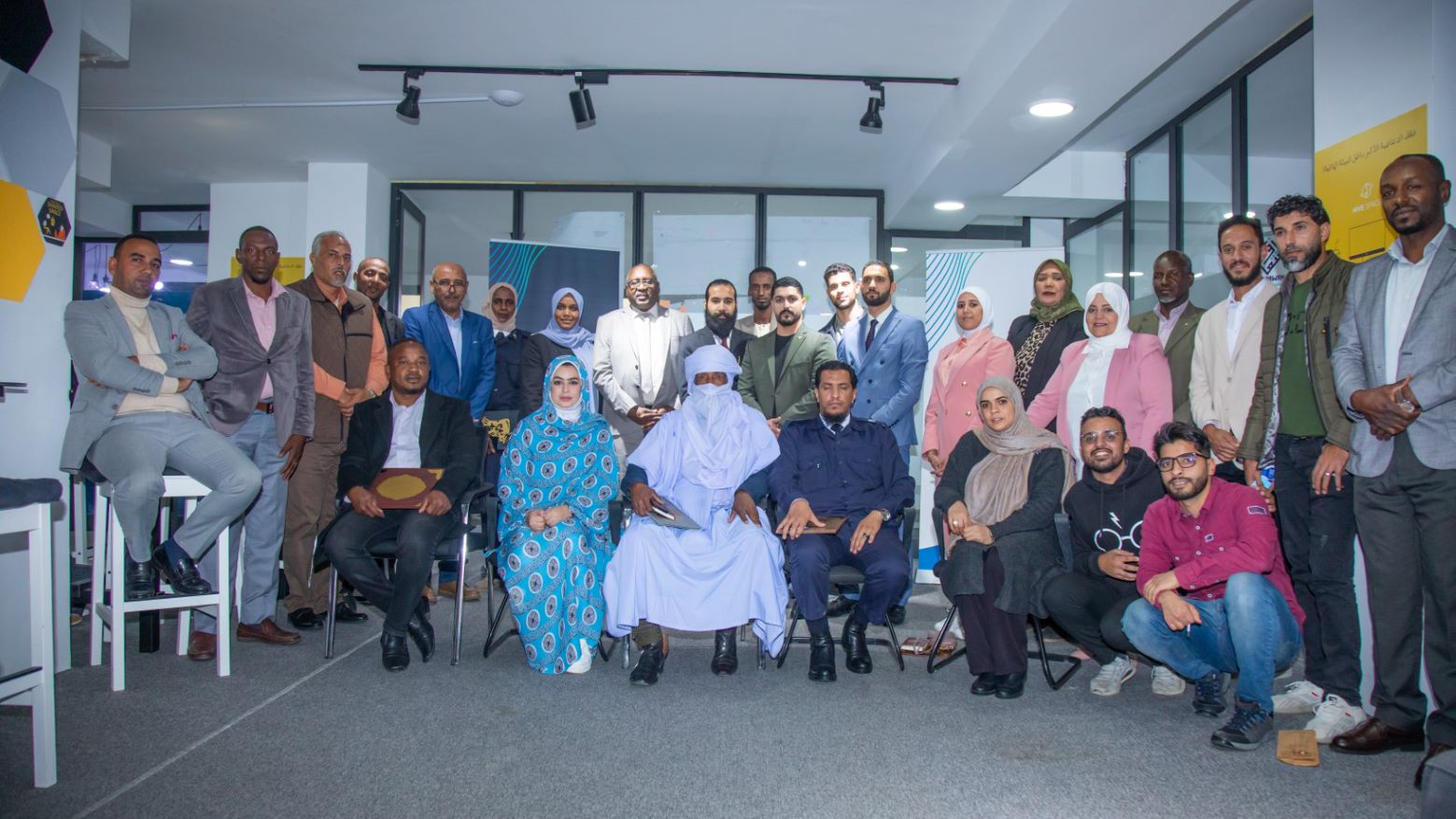Introduction
The “Preventing Electoral Violence” (PEV) project implemented by Moomken aimed to equip police officers and community actors with the necessary tools and knowledge to prevent and address electoral violence in Libya. The project, which lasted for nine months, focused on creating sustainable and reliable learning resources for police officers and community actors through the development of a PEV toolkit and three e-learning courses, as well as providing in-person trainings to 38 selected participants.
Background
Electoral violence has been a major concern in Libya, as it threatens the stability and integrity of the electoral process. The country has been facing ongoing political and security challenges since the 2011 overthrow of the former regime, which have led to a fragmented political landscape and a lack of effective security institutions. The security vacuum has enabled different armed groups to gain control over large parts of the country, making the electoral process vulnerable to violence and manipulation.
The project proposed by Moomken aimed to address this issue by providing police officers and community actors with the necessary knowledge and skills to prevent and respond to electoral violence. The project was based on USIP’s curriculum, which has been developed to address electoral violence in various countries and provides a comprehensive approach that focuses on understanding the root causes of electoral violence, early warning signs, and effective responses. By providing police officers and community actors with the knowledge and skills to prevent and respond to electoral violence, the project aimed to contribute to a more secure and free electoral process in Libya
Implementation methods
Activity 1: Toolkit and in-person training content development
Based on the PEV toolkit provided by USIP, the Moomken team developed a PEV toolkit over the course of the project with the support of Maya Al-Jizani. She is a Senior Trainer/Expert in Conflict Transformation, Common Ground Approach, Non-violent Communication, Active Citizenship, and Community Dialogue Approach in Jordan, Tunisia, Iraq, Libya, Syria, Yemen, Sudan, Palestine, and Lebanon. Her degree is in Cooperation, Peace, and Development.
The toolkit, developed over the course of the project, focuses on several key areas and includes Libyan examples and case studies. In addition to improving police image, partnering with observers and the local community to secure elections, analyzing the longstanding and root causes of conflict, especially social and political alignments, detecting early signs of election violence and taking rapid action, dialogue and conflict management tactics and creating communication channels to prevent election violence. For the toolkit to be relevant and effective, all cases studied in the four trainings were included.
In addition to developing the toolkit, Moomken has also designed an in-person training curriculum and agenda that is compatible with USIP’s PEV materials. Before attending the in-person training, participants will be required to complete USIP’s PEV course, and the in-person training will build on this foundation. The toolkit and training will be a valuable resource for organizations and individuals working to promote peace and stability in Libya. The team has reviewed and revised the draft, resulting in the final version of the PEV toolkit. Maya’s expertise and experience in conflict transformation and her International Master’s degree in Cooperation, Peace, and Development, ensured that the toolkit is tailored to the Libyan context and developed using the latest methodologies in the field.
The toolkit will be available in February
Activity 2: Training of Trainers
On September 27th, 2022, Moomken organization for awareness and media held a five-days TOT (Training of Trainers) workshop on Preventing Electoral Violence in Tunisia. The workshop was participated by a total of nine individuals (seven males, and two females). The training covered multiple areas of the topic, with an approximate duration of seven hours, including the definition of electoral violence, types of electoral violence, features of electoral violence, classification of countries in which electoral violence occurs, early detection, electoral risk management and conflict analysis, strategies to mitigate electoral violence, and the police’s role in electoral security.
The training was divided into five days, including coffee and lunch breaks, from September 27th to October 1st, 2022. The objectives of the training were to enhance the trainees’ capabilities on how to ensure community monitoring, provide a full understanding of the most effective methods for preventing election violence, train trainers to join a local network of trainers at the national level who can train social activists and police officers on programs to prevent electoral violence, and create training materials on preventing electoral violence that are tailored to the Libyan context.
Activity 4: PEV online training courses:
In order to provide support to community actors and police officers who will conduct local PEV post initiative in the next stage of the project, Moomken has developed e-learning courses on its Mocs.ly platform. These courses cover several key topics, including facilitation skills, designing a training program and agenda, and PEV in the Libyan context.
The courses on designing a training program and agenda and PEV in the Libyan context were designed by the Maya, who had previously designed the toolkit and provided the in-person training. The course on facilitation skills was designed by local expert Mohammed ben Hamza. These e-learning courses are designed to complement the in-person training and provide additional support to participants as they conduct local PEV trainings in their communities.
All participants are required to take the e-learning courses after participating in the in-person training. These e-learning courses will serve as an ongoing resource for participants, providing them with the necessary knowledge, skills, and tools to effectively conduct local PEV trainings and promote peace and stability in their communities.
The online courses available on MOCS.ly
Activity 5: In-Person Training for Police Officers and Community Leaders
Benghazi training workshop:
- The training workshop was held over a period of three days in Tripoli and targeted police officers and community leaders from Benghazi (5 male & 5 female). The training covered a wide range of topics including electoral violence definition, types and features of electoral violence, early detection, electoral risk management and conflict analysis, strategies for mitigating electoral violence, and the role of the police in electoral security.
- Based on suggestions made by the trainees, the Moomken team designed the agenda for the three-day training, which took place from November 28th to November 30th. Breakfast was allotted 20 minutes, and lunch was allotted an hour. On the first training day, the agenda was distributed, and the participants praised the commitment to the agenda.
- The objectives of the training were to provide a more accurate and deeper understanding of electoral violence in Benghazi in particular and all Libya in general, educate police officers and community leaders on prevention methods, and create opportunities for police officers and community leaders to collaborate on initiatives to prevent election violence and build networks between them.
- All participants completed the online micro-course provided by the USIP on their platform before the in-person training. The Moomken team followed up with the trainees to make sure they had finished.
- The trainers gave good feedback about the logistical arrangements and operations team of Moomken and the trainees who were carefully chosen for the training. They suggested that there should be two main trainers instead of a main trainer and a co-trainer, and that the training days should be extended to ensure that all training materials are covered. They also recommended changing the presentation’s template.
Ubari training workshop:
- The training program was held over a period of three days in Tripoli and targeted police officers and community leaders from Ubari (10 male & 3 female). The training covered a wide range of topics including electoral violence definition, types and features of electoral violence, early detection, electoral risk management and conflict analysis, strategies for mitigating electoral violence, and the role of the police in electoral security.
- Based on suggestions made by the trainees, the Moomken team designed the agenda for the three-day training, which took place from November 28 to November 30. Breakfast was allotted 20 minutes, and lunch was allotted an hour. On the first training day, the agenda was distributed, and the participants praised the commitment to the agenda.
- The objectives of the training were to provide a more accurate and deeper understanding of electoral violence in Ubari in particular and all Libya in general, educate the community on prevention methods, and create opportunities for police officers and community leaders to collaborate on initiatives to prevent election violence.
- The trainer mentioned that the logistics arrangements were incredibly impressive. The team assigned to them worked closely with them throughout the entire process and provided support in every way possible. They said that they felt incredibly comfortable knowing that they had highly experienced professionals who were there to help them. The resources and guidance provided enabled them to make the training an incredible success. The trainers were delighted with the selection of the trainees. They said that the participants were very well qualified and their objectives matched the training’s objectives.
- The main trainer mentioned that the co-trainer worked hard to ensure that the sessions were engaging and informative, adapting to different learning styles. The discussions and exercises were tailored to the needs of each trainee and they did their best to make sure that everyone gained something from the experience.
Barak Alshati training workshop:
- The training program was held over a period of three days in Sabha and targeted community leaders from Sabha (10 male & 3 female). The training covered a wide range of topics including electoral violence definition, types and features of electoral violence, early detection, electoral risk management and conflict analysis, strategies for mitigating electoral violence, and the role of the police in electoral security.
- Based on suggestions made by the trainees, the Moomken team designed the agenda for the three-day training, which took place from January 21 to January 23. Breakfast was allotted 20 minutes, and lunch was allotted an hour. On the first training day, the agenda was distributed, and the participants praised the commitment to the agenda.
- All participants completed the online micro-course provided by the USIP on their platform before the in-person training. The Moomken team followed up with the trainees to make sure they had finished.
- The objectives of the training were to provide a more accurate and deeper understanding of electoral violence in Barak Alshati in particular and all Libya in general, educate the community on prevention methods, and create opportunities for police officers and community leaders to collaborate on initiatives to prevent election violence.
PEV Trainers Network
This project is funded by USIP


